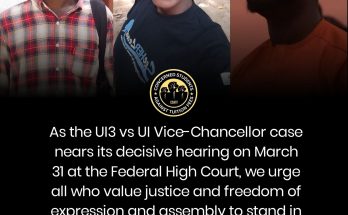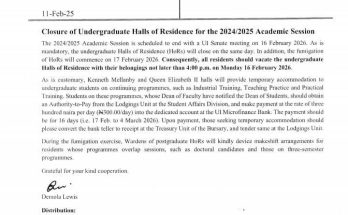Prof Abel Idowu Olayinka
The 12th Vice-Chancellor
Dear Stakeholder in the UI Project
1. I am Abel Idowu Olayinka, a 1977 Alumnus of Ibadan and a Professor of Applied Geophysics in the Department of Geology, Faculty of Science, University of Ibadan. I was appointed the 12th Vice-Chancellor
2. Our dear university has had a chequered history, dating back to 1948, when it was established as the University College Ibadan, in special arrangement with the University of London. According to the Foundation Principal, Professor John Kenneth Mellanby, ‘the provision of teaching for our students and the prosecution of original research by our staff were our most important duties’. Successive administrations
3. For example, our longest serving Vice-Chancellor
4. Similarly, my boss under whom I served as the Deputy Vice-Chancellor
5. The Vision of the University of Ibadan for the 21st century is to be a world-class institution for academic excellence geared towards meeting societal needs. My primary task as the chief executive is to drive, manage and strengthen the vision and dreams of our great institution, and thus set an agenda for development.
6. In consonance with the foregoing vision, the overall theme of our programme of action for Ibadan over the next five years has been entitled ‘Accelerated Development through Consolidation and Innovation’.
7. Consequently, as the Vice-Chancellor
8. My Mission is ‘To create a high performance University, with outstanding teaching and learning facilities, that is locally relevant, nationally pre-eminent and globally competitive’ and ‘To produce graduates who are eminently employable, entrepreneurial
9. Always conscious that we are inheritors of a hallowed and enviable tradition, we are a very attractive brand as an institution and this would be strengthened. At the heart of this strategy is a drive to further enhance our reputation. This will enable our University to continue to attract high quality teaching and research staff, together with talented students, and will also ensure that our degrees maintain their quality and prestige in the employment market place. Key attributes that enable us to enhance our reputation are the production of excellent research and the consistently high quality of our graduates.
10. This project is a collective effort and would involve creating leaders at every level; building teams and promoting team work; igniting the passion for success in our staff and students; involving every one; being innovative and creative; thinking outside the box and discovering opportunities; introducing positive change and making gigantic leaps forward, creating new products, processes and services; listening to others thus gaining new insights and being open to new ideas; and leading by example.
11. We would ensure pro-active, creative, innovative and pragmatic strategies by melding the traditional academic culture with the demands of a knowledge-based
12. We shall put in place mechanisms for communicating, monitoring, evaluating and re-evaluating our shared vision as stakeholders in the institution with key performance indicators, milestones and measures that are specific, measurable, achievable, realistic and time bound.
13. My style of leadership would be transformationa
14. Soon after I emerged the Vice-Chancellor
15. As your 12th Vice-Chancellor
16. The first priority is staff. A university is as good as its academic, technical and administrative staff. They are the ones who ensure the highest standards of teaching, learning, research and knowledge transfer. Good staff in turn attracts quality students. Consequently, on top of my agenda is to make sure our brightest and best, and that is the vast majority of our staff, have the space and time to be effective – to think in ways that nobody else has thought in a particular domain.
17. The second priority is students. Students are the lifeblood of a university. Attracting and developing the most talented students, as amply demonstrated by the immediate past administration,
18. As our third priority, we shall explore ways that UI can make itself less dependent on government funding; these will include expanding professional postgraduate programmes and Open Distance Learning, endowment revenues, donations and research grants.
19. The fourth priority is that we shall invest heavily in physical and infrastructural
20. The fifth priority is the provision of Information and Communication Technologies (ICTs) and related teaching aids and e-learning resources that will facilitate the teaching, research, community services, knowledge transfer and branding of UI as a digital institution. We shall put in place a robust plan that makes it easy for us to serve our various publics better using modern technology. This has become very urgent since we now live in a digital age, a world of computers, mobile phones and the internet.
21. The sixth priority is to increase research output. We shall encourage and support our researchers to generate more papers, patents and licences. We shall put in place incentive schemes and creative ways of thinking to increase our research output. We shall strengthen the existing and create new interdisciplina
22. We are under no illusion that achieving all our ambitious objectives would require a great deal of hard work, sacrifice, commitment and patience. However, given the unquestionable talent of our staff, students and alumni/
23. Arising from my previous assignments whether as Head, Department of Geology, Dean of the Postgraduate School or as the Deputy Vice-Chancellor
24. We humbly make a passionate appeal to our proprietor, the Federal Government – and its agencies, our distinguished alumni/
25. Any assistance to UI, our common heritage and a national resource, is support for the Nigerian nation. I trust we can continue to count on your kind support.
26. Thank you all and God bless.
Abel Idowu Olayinka





